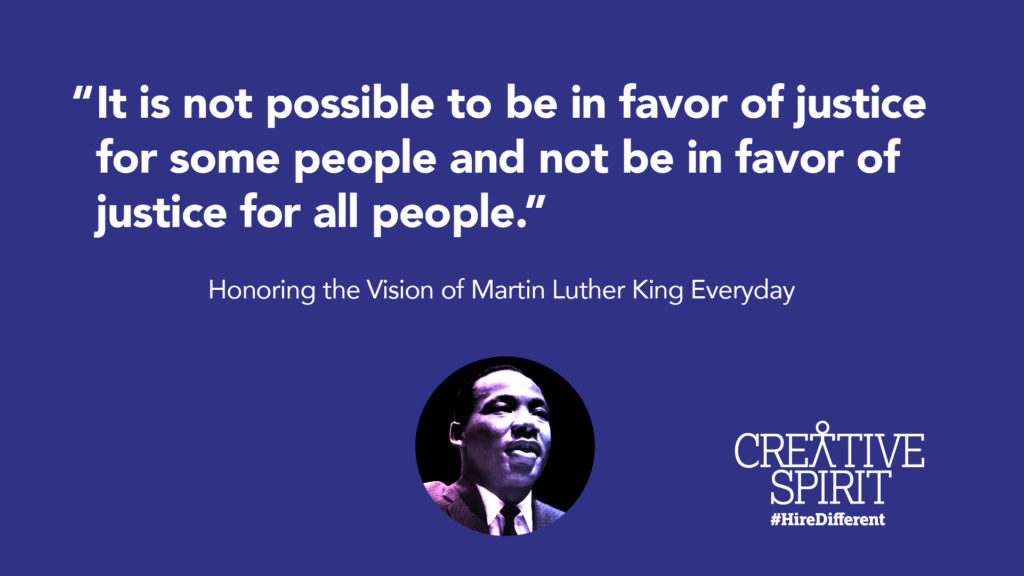By: Menachem Rephun, Creative Spirit Communications Manager

More than half a century after his life was tragically cut short, the Rev. Dr. Martin Luther King Jr. (January 15, 1929 – April 4, 1968) remains one of the most revered and influential civil rights leaders of the 20th century. Through non-violent protest and organized campaigns of civil disobedience that resulted in the Civil Rights Act of 1964 and the Voting Rights Act of 1965, King was instrumental in achieving voting rights for African-Americans and ending segregation in the Jim Crow South. While King’s efforts to fight racial discrimination are highly celebrated, an aspect of his legacy that has received less attention is his influence on inclusion and fair treatment for the millions of Americans with disabilities. In fact, a direct link can be traced from King’s political philosophy and activism in the 1960s to the landmark Americans With Disabilities Act (ADA) of 1990, which transformed accessibility and protection against discrimination. “Resulting from Dr. King’s extraordinary efforts in the civil rights movement, the Americans with Disabilities Act (ADA) was signed on July 26, 1990,” an article by AMS Vans states. “He impressed the mentality upon society that separate is not equal. At one point in time people with apparent disabilities were prohibited to be seen in public in order to prevent sensitivities of people without disabilities.” Arlene Mayerson, Directing Attorney of the Disability Rights Education and Defense Fund (DREF), points out that many of the strategies utilized by the Civil Rights movement, such as sitting at segregated lunch counters and refusing to move to the back of public buses, were emulated by disability rights activists leading up to the passage of the ADA. Martin Luther King Day is an opportunity to explore MLK’s legacy in relation to the disability rights movement. By exploring MLK’s life and work, we can gain deeper insight into improving disability rights and inclusion, especially with regard to employment, where equity for people with disabilities is still urgently needed. According to the Bureau of Labor Statistics, only 19.1% of Americans with disabilities were employed in 2021, compared with 63.7% of people without disabilities. MLK’s nonviolent approach to achieving reform resulted in enormous progress during his lifetime, and it can continue to make a difference for the disabled community as well.
To fully appreciate King’s impact on the disability rights movement, it’s crucial to understand the details of his life and the influences that shaped his worldview. Born in Atlanta, Georgia on Jan. 15, 1929, King (born Michael King Jr.) was heavily influenced by the opposition of his father, a Baptist pastor and missionary, to racial injustice and any form of class superiority. While initially uncomfortable and skeptical regarding religion, King became more drawn to his faith in his junior year of high school, ultimately deciding to pursue a career in the Baptist ministry himself. Under the mentorship of Morehouse College President Benjamin E. Mays, a staunch advocate for racial equality, King came to view Christianity as a force for social change. King was also deeply influenced by the philosophy of non-violence and civil disobedience espoused by Mahatma Gandhi (2 October 1869 – 30 January 1948), the renowned Indian civil rights leader who was instrumental in securing India’s independence from Great Britain in 1947. According to Biography.com, King “drew heavily on Gandhian principle[s] of nonviolence in his own civil rights activism, writing that ‘while the Montgomery boycott was going on, India’s Gandhi was the guiding light of our technique of nonviolent social change.’ In a 1960 essay, “Pilgrimage to Nonviolence”, King traced a direct line between Gandhi’s perspective on nonviolence and his own religious faith. “I came to see for the first time that the Christian doctrine of love operating through the Gandhian method of nonviolence was one of the most potent weapons available to oppressed people in their struggle for freedom,” King wrote. Biography.com adds that King “was already familiar with peaceful civil disobedience through American writers like Henry David Thoreau, and he liked Gandhi’s idea that oppressed people could use truth or love as weapons in their struggle for justice.” King first put this philosophy into practice through his leadership of the Montgomery Bus Boycott, which began on Dec. 5, 1955, following the refusal of a Black woman, Rosa Parks, to give up her bus seat to a white passenger, and ended on Dec. 20 of that year, with the Supreme Court’s ruling that segregated buses were unconstitutional. The disability rights movement would go on to directly (and successfully) emulate King’s non-violent approach to social justice with its own forms of civil disobedience, such as sit-ins, boycotts, blocking traffic, and protest marches. One of the most powerful and unforgettable demonstrations occurred during the “Capitol Crawl” on March 13, 1990, when over 1,000 people marched from the White House to the U.S. Capitol to demand the passage of the ADA. Upon arriving at the Capitol, 60 of the protestors left their wheelchairs and other mobility aids and crawled up the Capitol steps. Just a few months later, on July 26, the ADA was signed into law.
King’s impact and influence on the disability rights movement has been acknowledged by many of its prominent leaders. “The disability rights movement modeled itself on the successes, vision and passion of the civil rights movements that preceded it,” Andrew J. Imparato, President and CEO of the American Association for People With Disabilities, has said. “Dr. Martin Luther King, Jr. is a hero for disability rights activists around the world.” Sandra Swift Parrino, a former Chairperson of the National Council on Disability who helped develop and ensure the passage of the ADA, has also cited King as an influence. “The meaning of the ADA is well articulated by Dr. Martin Luther King in his “I have a Dream” speech,” Parrino wrote in a 2012 blog post, Toward Independence. “Dr. King said “I have a dream that my four children will one day live in a nation where they will not be judged by the color of their skin but by the content of their character.” Similarly, people with disabilities should be appreciated for their abilities and the content of their character. While there is still significant progress to be made, inclusion and accessibility for people with disabilities in school, at work, and in public life has substantially improved over the past thirty years, with improved accessibility in workplaces and public transportation, and broadened awareness and representation of people with disabilities in advertising, media, and other fields. There is no doubt that these advancements would not have been possible without the idealism and singular, visionary leadership of Martin Luther King Jr., who demonstrated the effectiveness of nonviolent protest, championed the rights of marginalized Americans from all walks of life, and inspired countless others to follow in his footsteps. King himself emphasized the universality of his own message when he famously stated “It is not possible to be in favor of justice for some people and not be in favor of justice for all people.” Towards the end of his life, King expanded his civil rights advocacy to include anti-poverty efforts, mainly through his 1967 Poor People’s Campaign, which urged the federal government to take stronger action in eliminating poverty. This initiative, which was sadly cut short by King’s assassination, would have strongly benefited people with disabilities dealing with economic adversity.
Reflecting on King’s legacy in 2023, it is clear that time has only strengthened his powerful rallying cry for all supporters of equity and inclusion, including for the roughly 61 million Americans with disabilities. Creative Spirit is proud to be a part of that continuing effort. Together with our partner organizations and supporters, we strive to honor Dr. King’s dream every day by ensuring equitable, fair-wage employment for all Americans with disabilities. Though the pace of progress is not always as fast or immediate as many would hope, Dr. King’s words serve as motivation to continue persevering. As he once said, “If you can’t fly then run, if you can’t run then walk, if you can’t walk then crawl, but whatever you do you have to keep moving forward.” By adhering to that perspective and moving forward continuously over the past 60 years, enormous change has already been accomplished, and through our collective efforts, we can still achieve so much more.






